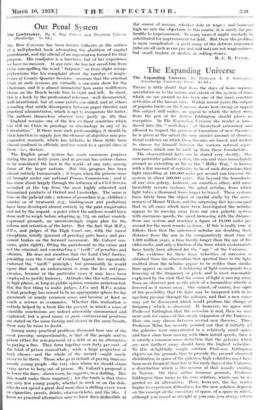Our Penal System
The Lawbreaker. By E. Roy Calvert and Theodora Calvert. (Routledge. 7s. 6d.)
MR. ROY CALVERT has been known hitherto as the author of a well-pleaded book advocating the abolition of capital punishment, and the official of an organization formed for that purpose. His coadjutor is a barrister, but of her experience we have no measure. At any rate, she has not saved him from twice mis-spelling the word " Serjeant," or from slight misap- prehensions like his complaint about the number of magis- trates at County Quarter Sessions— unaware that the criminal trials at such sessions are virtually a one-man show for the Chairman, and it is almost immaterial how. many wallflowers bloom on the Bench beside him to right and left. -In short, this is.a book by the professional reformer—well documented, well-intentioned, but at some_points one-sided, and at others revealing that subtle discrepancy between paper theorist and practical administrator, which is apt to exasperate the latter. The authors the►mlves observe very justly (p. 38) that " England remains one of the few civilized countries which has still no Chair in penology or criminology in any of its Universities." • If there were such professorships,- it should be their. function to supply just the element of objective non-pro- pagandist research, which has hitherto in these fields been almost confined to officials, and too much to a special class of them—i.e., doctors.
The English penal system has made enormous progress during the past forty years, and at present has serious claims to be considered the best in the world—at any rate, among those of the larger nations. But this progress has been almost entirely bureaucratic ; it began when the prisons were all brought under one national Prisons Commission ; and it has come about largely through the influence of a Civil Service recruited at the top from the most highly educated and humanized products of Oxford and Cambridge. The same is true on.the judicial side ; reforms of procedure (e.g., children's courts) or of treatment (e.g., binding-over and probation) have been developed almost entirely by the paid magistrates and not by the unpaid—a point which the authors would have done well-to weigh before adopting (p. 75), on rather crudely expressed grounds, an unconvincingly vague plan for the reform and, retention of the latter. But the fact that M.P.s, J.P.s, and judges. of the High Court are, with the rarest exceptions, totally ignorant of penology puts heavy and per- sistent brakes on the forward movement. Mr. Calvert cen- sures, quite rightly, fitting the punishment to the crime and not the criminal, and constructing a " tariff " of penalties and offences.- He does not mention that the Lord Chief Justice, presiding over the Court of Criminal Appeal, has repeatedly endorsed the " tariff " principle ; but presumably he would agree. that such an endorsement is none the less anti-pro- gressive,. because in the particular cases it may have been employed.to justify leniency. Attitudes like this will continue in high places, so long as public opinion remains uninstructed-. But the first thing to make judges, J.P.s and M.P.s realize is that penology has ceased to be an appropriate sphere for lay guesswork or manly common sense, and become at least as much. a science as economics. Whether this realization is entirely helped by a book like the present, in which a mass of scientific conclusions arc indeed admirably summarized and explained, but a good many ex pane controversial positions are stated on the some footing and almost in the same breath, there may be room to doubt.
Among many practical problems discussed here one of the most pressing, unquestionably, is that of the people sent to prison either for non-payment of a debt or as an alternative to paying a fine. They form together over forty per cent. of the total of prison conunittals ; while a large proportion of both classes—and the whole of the second—ought surely never to be there. Those who go in default of paying .fines are mostly young people—the very class whom we should strain every nerve to keep out of prison. Mr. Calvert's- proposal is to lower the fines—down even, he suggests, to a shilling. 'But this would make them nugatory ; for the truth is that there are very few young people, whether in work or on the dole, who do not spend a great deal more than a-shilling every week ormeigarettes,: sweets, drinks, cinema-tickets; and the like. know no practical alternative save to have fines-deductible at the _source of income, whether dole or wage ; and however high we rate the objections to this course, it is surely far pre- ferable to imprisonment. In many cases it might similarly be substituted for imprisonment for debt. But there the problem is more complicated—a good many of the debtors concerned (who are all such as can pay and will not) are not wage-earners, but small traders or dealers or rolling-stones.
- R. C. K. Exson. •






































 Previous page
Previous page